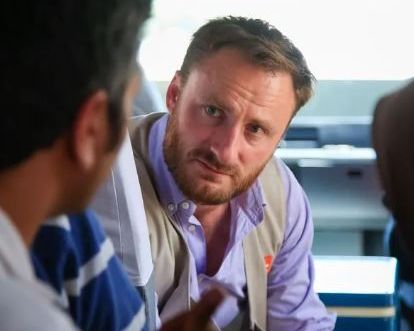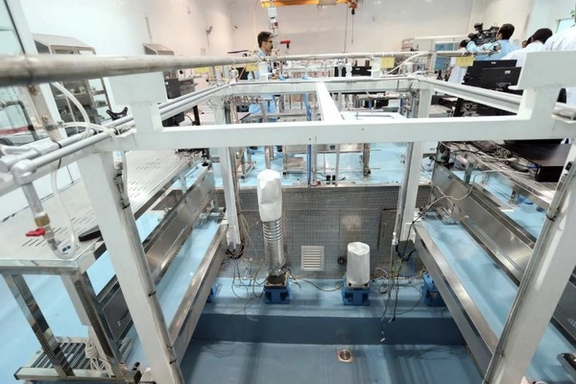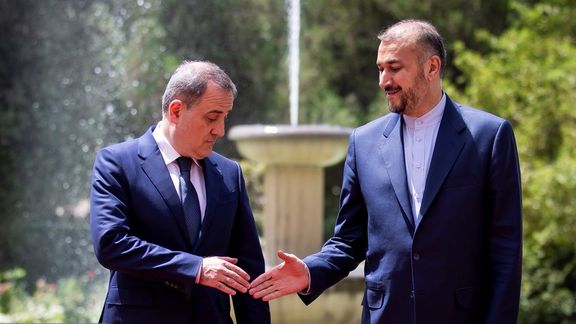Belgian Parliament Committee Postpones Vote On Controversial Treaty

Belgian lawmakers Tuesday debated a prisoner exchange treaty with Tehran that critics oppose, saying it will release an Iranian diplomat convicted of terrorism.

Belgian lawmakers Tuesday debated a prisoner exchange treaty with Tehran that critics oppose, saying it will release an Iranian diplomat convicted of terrorism.
Justice Minister Vincent Van Quickenborne urged the foreign relations committee of Belgium's lower house to back an accord that intelligence services believed could avert an increased threat against Belgian interests.
"People's lives are at stake," the minister said, adding one threat that had materialised was the detention of a Belgian man in Iran since February.
Many lawmakers spoke about the possibility of an exchange to secure the release of the man, first identified by Iran International as a 41-year-old aid worker, and Swedish-Iranian academic Ahmadreza Djalali, who had taught in Belgium and has been sentenced to death in Iran.
Iran has called for the release of Assadollah Assadi, sentenced to 20 years in prison in Belgium in 2021 over a foiled 2018 bomb plot. His was the first trial of an Iranian official for suspected terrorism in Europe since Iran's 1979 revolution.
Many Iranian groups and activists as well as former senior US officials have urged the Belgian parliament not to approve the treaty, citing increased risk of fresh Iranian terrorism.
Several lawmakers expressed concerns that it could encourage Iran or others to seize Belgians.
"Would this open the door to a sort of hostage diplomacy?" said Greens member Wouter De Vriendt.
The committee was due to vote on the bill on Tuesday but adjourned the session until Wednesday after nearly four hours of debate. It is likely to be put before the full 150-member chamber on Thursday.

Brussels has confirmed that Iran has been holding a Belgian man for the past four months under “espionage” charges as it weighed a controversial prisoner swap treaty with Tehran.
Belgium’s Justice Minister Vincent Van Quickenborne said Tuesday the man was seized in Iran on February 24 and has been in “illegal” detention since.
He did not identify the man but he was most likely referring to Olivier Vandecasteele, a 41-year-old Belgian aid worker who has served in various international humanitarian organizations since at least 2006.
The announcement by the ministry came after Iran International revealed the identity of the Belgian national, who had previously worked in India, Afghanistan, and Mali and later became the director of Norwegian Refugee Council’s Iran operations in 2015 and assumed the same position with Relief International in Iran in 2020. On July 2, an informed source had told Iran International that at least two Belgian citizens are currently in prison in Iran.
A draft law proposed by the Belgian government to the parliament could put the seal of approval on an agreement with Iran, which could lead to the release of Assadollah Assadi, an Iranian diplomat serving a 20-year prison sentence in Belgium for planning a terror attack in Paris four years ago.
Numerous people and groups from around the world have warned about the imminent perilous consequences of the prisoner exchange treaty, calling “the green light to state terrorism” that only emboldens the Islamic Republic.

Iran is likely to be a central issue in United States President Joe Biden’s mid-July Middle East tour – with differing expectations as to what he may achieve.
Biden’s trip, July 13-16, has reportedly put on hold until later this month further talks to revive the 2015 Iran nuclear deal, the JCPOA (Joint Comprehensive Plan of Action), pushing them beyond a related four-week deadline announced early June by Rafael Mariano Grossi, head of the International Atomic Energy Agency (IAEA), for the agency’s ability to certify the peaceful natureof Tehran’s atomic program.
By the last quarter of 2022, Biden’s leeway could be restricted by Democratic Party losses in mid-term Congressional elections. The continuing expansion of Iran’s nuclear program beyond JCPOA limits, including the enrichment of uranium to 60 percent purity, has led many of the deal’s US critics, Democrats but especially Republicans, to call failure on Biden’s approach.
Some speculation over Biden’s Middle East trip – which will take in Israel, the occupied Palestinian West Bank, and Saudi Arabia – centers on whether he will meet Saudi Crown Prince Mohammad bin Salman, whom Biden criticized on coming to office after US intelligence implicated him in the 2018 murder of dissident journalist Jamal Khashoggi in the Saudis’ Istanbul consulate.
‘Not about Saudi Arabia’
Biden told reporters at the Nato Madrid summit last week that his visit to Riyadh was to a summit of Gulf nations. "It’s in Saudi Arabia, but it’s not about Saudi Arabia,” Biden said. “And so there’s no commitment that is being made or – I’m not even sure; I guess I will see the king and the crown prince, but that's – that’s not the meeting I'm going to. They’ll be part of a much larger meeting.”
The president will meet leaders of the six-member Gulf Cooperation Council – Saudi Arabia, the United Arab Emirates, Oman, Kuwait, Qatar and Bahrain – as well as the leaders of Egypt, Iraq and Jordan.
US officials have suggested the president’s visit will take forward plans for closer military co-operation between Israeli and the Arab Gulf States, aimed at thwarting Iranian and Iranian-supplied missiles and drones, and building on the US-brokered 2020 Israeli ‘normalization’ agreements with the UAE and Bahrain.
Pumping more oil?
Biden said in Madrid that the Israelis had “come out so strongly for my going to Saudi.” But it remains unclear whether a new defense arrangement would make JCPOA revival harder or help make its revival more palatable to Saudi Arabia and Israel.
While pragmatists have argued Biden should seek Saudi agreement to pump more oil and curb cost-push inflation that has sent gasoline prices in the US to around $5 a gallon, human-rights advocates say he should concentrate on holding the Saudis and others accountable over human rights. Supporters of the JCPOA, meanwhile, argue the deal’s revival would ease oil prices by easing US sanctions restricting the flow of Iranian crude.
King Salman, now 86, is widely reported to oppose ‘normalization’ with Israel ahead of the acceptance of a viable Palestinian state, in line with Arab League policy since 2002. In 2008, according to cables unearthed by Wikileaks, King Salman urged the US to “cut off the head of the snake” with military strikes on Iranian nuclear sites.

Iran’s deputy foreign minister has said Israelis cannot even dream of attacking Iran despite numerous attacks, assassinations and infiltrations by Israel in recent months.
Ali Bagheri-Kani, who is also Tehran’s chief nuclear negotiator, told Yemen’s Houthi al-Masirah TV on Tuesday that “even if they attack Iran in their dreams, they should know that they certainly will not wake from that dream.”
Iranian officials and commanders keep repeating threats against Israel, warning of a crushing response should it dare to act the Islamic Republic, with Brigadier General Kioumars Heydari, the commander of the Iranian Army’s Ground Force, vowing that Tehran will raze Tel Aviv and Haifa to the ground if Israel makes any mistakes.
In latest apparent instance of Israel-Iran cyberwar, the company building the light rail network for the Tel Aviv area said Monday that its website was temporarily disrupted by a foreign cyberattack, as Iranian media reported that their hackers managed to infiltrate the servers of the “Tel Aviv’s Metro,” leading to ridicule online because the city has no underground train system.
The attack came just a day after Iranian antigovernment hacktivist group ‘Uprising till Overthrow' said it hacked the website and portals of Iran’s Islamic Culture and Communication Organization and a few days later another hacking group called Predatory Sparrow targeted three of Iran’s major steel plants.
After repeated incidents showing widespread infiltration in its intelligence and security networks reportedly by Israel, Iran’s IRGC admitted late in June that its counter-intelligence was targeted.

The Jerusalem Post Monday cited an annual security report by Hamburg highlighting September’s arrest of a man for exporting equipment to Iran without licenses.
The man, named only as ‘Alexander J’ due to German privacy laws, allegedly between 2018 and 2020 sold Iran laboratory equipment, including four spectrometers, that required special licenses and was worth nearly 1 million Euros.
The Hamburg report said two alleged accomplices were still sought, and listed the case under ‘proliferation,’ which it defined as “the procurement of products for the production of nuclear, biological and chemical weapons of mass destruction and the corresponding carrier technology (rocket technology), including the know-how required for this."
Iran's regime is mentioned 82 times in the 194-page Hamburg report that focuses on a wide range of security threats to Hamburg's democracy.
At the time of Alexander J’s arrest in September, German police searched offices and apartments in 11 separate locations, across three German states – Hamburg, Schleswig-Holstein and North Rhine-Westphalia.
A report last year from the Washington-based Institute for Science and International Security (Isis) said the case reflected “the continued effort of Iran to break trade control laws and sanctions of other nations to procure items for its nuclear and ballistic missile programs.” Isis said Iran had in the Alexander J case not sought permits required under the terms of the 2015 Iran nuclear deal for equipment that “could contribute to sensitive activities, including enrichment-related activities, reprocessing or heavy-water-related activities.”

Foreign ministers of Iran, Azerbaijan, and Turkey are to meet in Tehran soon in a regional format, Iran’s foreign minister announced on Monday.
Hossein Amir-Abdollahian made the announcement at a joint press conference with his Azerbaijani counterpart Jeyhun Bayramov who arrived in Tehran for an official visit Monday.
Iran’s top diplomat also said that high-level experts from Azerbaijan, Armenia, Georgia, Russia, Iran, and Turkey will also be meeting soon in the '3+3' format and their meeting will be followed by a meeting of the foreign ministers of these countries in Tehran or another Iranian city.
The dates of the two summits, as well as Azerbaijani President Ilham Aliyev's planned visit to Tehran, are to be decided during the Azerbaijani foreign minister’s visit, Turkey’s official news agency Anadolou reported Monday.
Bayramov said at the press conference that Baku supports Iran's suggested formats, including the 3+3 format, for the summits.
During the press conference, Amir-Abdollahian said “misunderstandings” between Tehran and Baku have cleared up in the past ten months.
Tensions rose between Iran and its northwestern neighbor in September 2021 after Azerbaijan's arrest of Iranian truck drivers and its joint military drills with Turkey and Pakistan, which began September 12 in Baku, about 500km from the Iranian border. This was followed by Iranian military exercises near the Azeri border.
Tehran also has serious concerns over growing relation between Baku and Tel Aviv in recent years. Israel is one of Baku’s major oil customers and has reportedly been allowed to use Azerbaijan’s airbases. The topic was not brought up in the press conference Monday.
The Iranian foreign minister stressed the importance of territorial integrity of Azerbaijan and added that Tehran “reaffirms its support for the peaceful settlement of the ongoing Karabakh conflict based on the well-known principles of the international law."
“We are prepared as before to continue our support and assistance in this regard, so that the remaining issues [between Azerbaijan and Armenia] would be resolved on the basis of respect for the territorial integrity and sovereignty of the involved parties and through political dialogue,” he said.
Armenian Prime Minister Nikol Pashinyan and Azeri President Ilham Aliyev announced last month that the two countries will set up border security and delimitation commissions to settle their decades-long conflict over the Nagorno-Karabakh region.
Amir-Abdollahian described energy and transit as "two key areas of cooperation" between Tehran and Baku and said the two sides will sign their final agreement on power swap during Iranian Energy Minister Ali Akbar Mehrabian’s upcoming visit to Baku while his Azeri counterpart told reporters that the volume of trade between Tehran and Baku increased by 30 percent in 2021 but could still grow more.
According to Azerbaijan’s Apa TV, Bayramov also met with the Iranian President Ebrahim Raisi and discussed joint projects in the fields of energy and transport and emphasized the importance of creating new transport links between Azerbaijan’s East Zangezur economic region and the Nakhchivan Autonomous Republic through Iran as part of the north-south transit corridor.
The settlement of the conflict and delimitation of their borders has huge impacts on Iran’s northwestern transit roads and trade. Iran’s border with Azerbaijan increased by 132-kilometer after Azerbaijan’s victory against Armenia in the Nagorno-Karabakh War and a Russian-brokered deal between Azerbaijan and Armenia in November 2020.